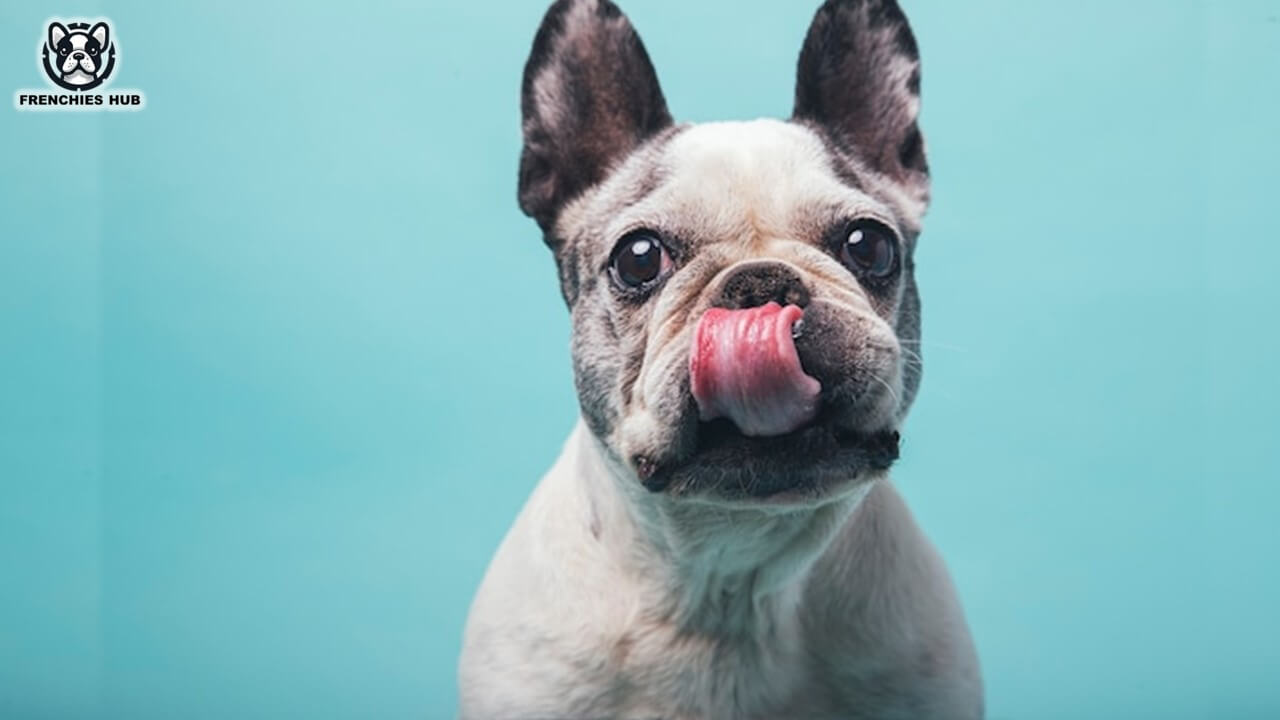In the world of pets, French bulldogs stand out as the cutest companions, captivating hearts with their endearing behaviors. One such behavior, watching your dog stick out its little tongue to lick its lips, embodies the pinnacle of adorable. However, when this action becomes excessive, it transforms from a simple display of cuteness into a sign that may indicate underlying medical issues. Through years of experience and a deep understanding of these lovable Frenchies, I’ve learned that they are not just trying to be cute but are often communicating something more critical.
Observing your French bulldog licking lip excessively should prompt quick action to help avert a potentially life-threatening situation. This blog looks at various things you might be doing that could cause this behavior, as well as also examining the medical conditions that could be the cause. It’s essential to recognize these signs early and respond appropriately to ensure the health and happiness of our furry friends. As a pet owner, interpreting these signals correctly and providing timely assistance can make a significant difference in their well-being.
Possible Causes of My French Bulldog’s Lip Licking Behavior
Owning a French Bulldog brings with it a bounty of joys and a few puzzles, one of which might manifest as frequent lip licking. Drawing from my personal journey with my Frenchie, alongside in-depth research into canine behavior, I’ve come to understand this behavior as a multifaceted signal that can stem from various sources, ranging from emotional distress to physical discomfort.
French Bulldog Anxiety
French Bulldogs, renowned for their status as companion breeds, form deep emotional bonds with their owners. The experience of being separated from their human companions, even if just for a short duration of staying home alone, can stir feelings of being threatened, anxious, or nervous.
This emotional turmoil often results in lip licking, a behavior that serves as an appeasement gesture or a means to seek comfort. Without proper intervention, such anxiety can progress to a severe stage, necessitating medication and dedicated time for rehabilitation. Potentially stressful situations—like the loud booms of Fireworks, the rumble of a Thunderstorm, the jarring sound of Sudden noise, the loneliness of Spending time alone at home, the anxiety of a Vet visit, or the disorientation of Changes in environment due to relocation—are typical triggers for this anxious behavior.
Dental Issues, Stuck Objects, and Harmful Plants
A seemingly harmless walk in the park can escalate into a health concern if your Frenchie ends up chewing on a branch or encounters Foxtail grass, leading to painful gums or swollen salivary glands. Such incidents, alongside dental problems like Tooth decay and gingivitis, compel them to lick their lips and paws in an attempt to ease the pain. The presence of dangerous spikes on plants like Foxtail grass can cause severe pains and, if left unchecked, these spikes can travel to internal organs like the lungs, posing a significant health risk.
Insect Bite
An insect bite on the lips, mouth, or face can inflict pain, swelling, and discharge, compelling your Frenchie to lick the affected area. This action is a natural response to the itchy and hot sensations caused by histamines, potentially leading to further complications like cracked skin or infection if the area becomes overly irritated.
Unpleasant Chemicals
The introduction of new things into the home environment can disrupt the familiar balance your dog is accustomed to. Exposure to harsh cleaners and other chemicals can leave behind strange smells and tastes that your dog may attempt to identify or neutralize by licking their faces or other surfaces, driven by their instinct to maintain a naturally clean environment.
Foreign Thing Stuck in Mouth
Engagement in playing with bones, rawhides, or stumps can sometimes lead to these objects becoming lodged in your Frenchie’s mouth, resulting in frantic licking as a mechanism to dislodge the object.
Contact with Poisonous Plants
Curiosity may lead your Frenchie to sniff or lick poisonous plants bearing a strong scent or presenting an unusual appearance. Commonly found plants such as English ivy, Oleander, Mistletoe, Yew, Jimsonweed, Castor bean, Cyclamen, Dumbcane, and Toxic mushrooms in the local park or a neighbor’s garden can be extremely dangerous if ingested, posing a risk of poisoning.
Nausea in French Bulldogs
Certain health conditions can induce an urge to vomit, with your Frenchie turning to lip licking as a pre-vomit behavior. Consumption of toxic substances or materials that are hard to digest can trigger this nauseous response, signaling a need for immediate attention.
Seizures in French Bulldog
In more severe cases, lip licking can be a symptom of an impending seizure. French Bulldogs may become nervous and seek reassurance from their owners during the pre-ictal phase, which can occur seconds to hours before the seizure itself. Conditions like epilepsy, Liver disease, Poisoning, Heatstroke, Calcium deficiency, Low blood sugar level, and Anemia are potential underlying causes.
Dehydration
Especially prone during the summer season, French Bulldogs can suffer from dehydration, leading to excessive lip licking as they attempt to regulate body temperature and replenish lost fluids. Signs of dehydration also include becoming lethargic, highlighting the importance of ensuring constant access to freshwater.
Through understanding and addressing the root causes of lip licking, owners can ensure their French Bulldogs lead a comfortable and happy life.
How to Support a French Bulldog Exhibiting Lip-Licking Behavior
When your French Bulldog begins to display unusual behavior such as excessive lip licking, pinpointing the trigger behind this action is crucial. A comprehensive health check by your vet can illuminate underlying issues. This examination might extend beyond a visual inspection of the dog’s gums, belly, and teeth to include a blood test or urine test. Such detailed diagnostics help in identifying any health concerns that could be causing discomfort or stress to your pet, manifesting in behaviors like lip licking.
Furthermore, if the root cause of this behavior is anxiety, providing emotional support and affection becomes essential. Recognizing that dogs, much like humans, are social beings capable of feeling and expressing emotions, fostering a supportive environment can make a significant difference. Your French Bulldog’s well-being hinges not just on physical health but emotional health too, underscoring the importance of addressing both aspects to mitigate such behaviors effectively.
Solutions for Overcoming Excessive Lip Licking in French Bulldogs
In addressing the issue of excessive lip licking in French Bulldogs, it’s pivotal to first recognize the cause behind this behavior. Often, this can be a manifestation of anxiety or discomfort, making it essential to observe your dog for any signs of nervousness or appearing unsure about how to react to their surroundings. An understanding of these cues can prevent situations that may escalate to the dog feeling threatened and biting someone out of fear, be it a friend, family member, or anyone getting too close without properly introducing themselves.
To mitigate anxiety and keep your Frenchie from becoming too anxious, engaging them in play with a flashing ball that glows upon hitting the ground and continues to light up for a few seconds, turning in various directions, can be incredibly effective. This not only captures their attention but also serves as a distracting activity to divert their mind from whatever has upset them. Such interactive toys play a crucial role in providing comfort and reducing feelings of anxiety.
Should the licking persist and seem unusual or sudden, it’s critical to consider the possibility of underlying medical problems. A visit to the veterinarian is advisable for a thorough health check, which might include blood or urine tests to diagnose any health issues accurately. Furthermore, if the excessive licking occurs during training, indicating the dog may feel overwhelmed, adjusting the task to make it easier for them to understand and complete—and promptly rewarding their efforts—can greatly assist in reducing stress and promoting a positive learning environment.

